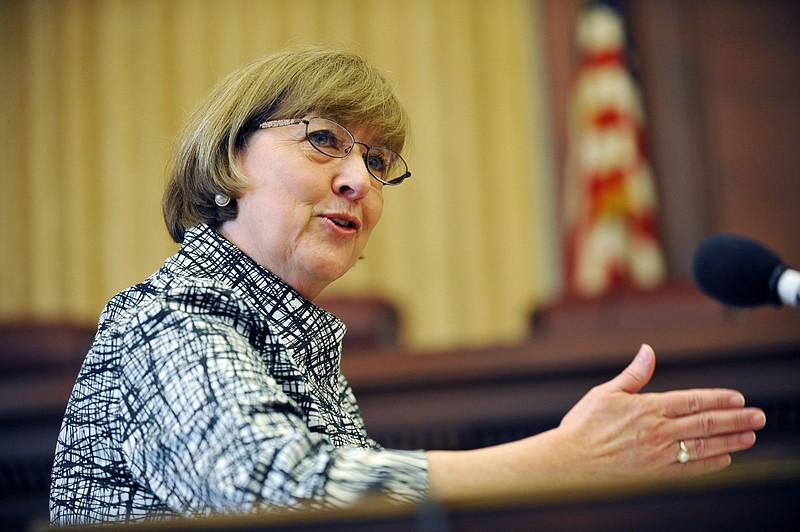Today is Patricia Breckenridge's first day as the Missouri Supreme Court's chief justice.
She credits a ninth-grade civic education teacher in Nevada, Missouri, with igniting her passion for the judiciary - a career she's followed for 33 years.
"Marie Buckner ... taught me about the fundamental principles of our government. Particularly the role of the judicial system," Breckenridge recalled Tuesday, as she talked with reporters about taking on her new duties. "She didn't just teach me about it - she valued it.
"And that was communicated to her students."
However, 61-year-old Breckenridge added, she didn't discover that passion until she became an associate circuit judge in Vernon County in 1982, appointed by Gov. Christopher Bond to fill a vacancy. She was re-elected to the job until 1990, when Gov. John Ashcroft named her to the appeals court's division in Kansas City.
Gov. Matt Blunt named her to the Supreme Court in 2007.
"When I was a (trial) judge, I saw first-hand how the importance of the courts and the principles of the court are in action," she said, "and how each case may be the most important thing in a citizen's life."
Breckenridge said people expect to be treated well, "and their impression of our court system is formed by how they are treated."
Treating people with respect applies even to those charged with, or convicted of, criminal activities, she said.
She supports efforts to keep children from becoming delinquents, so they don't get started on a criminal life.
Also, she has been a long-time advocate for better civics education - especially as it relates to the courts - and expects to continue that work as the state's new chief justice.
"Folks would like to label judges as liberal or conservative, law-and-order or libertarian, and lots of other labels," Breckenridge explained. "Judges instead choose to decide cases not according to what their personal views are, or how they would like to decide cases, but according to the law."
Then why do we see lengthy decisions from appellate courts, with controversial and dissenting opinions?
"Because the law is multi-faceted and complex, and the decisions aren't always easy," she said. "Reasonable minds can differ - you can read the same words, but they can be interpreted in different ways.
"The law is gray - it's not one-plus-one equals two."
At the Supreme Court, at least four judges have to agree for a ruling to be issued and
Breckenridge said sometimes it may take awhile for the court to issue an opinion because the judges are debating among themselves what wording will be best for that ruling, to explain why the court reached its decision.
"One of the interesting things about the court is how diverse it is," she added. "We all come from diverse personal (and) work experiences. And all of those inform our decisions and make them better."
She expects the court system to keep improving its use of technology and public access to court activities.
Breckenridge noted times have changed since she graduated from law school in 1977.
"When I was appointed (in 1982), there were 14 other women who were judges in the state," she recalled. "There were no women appellate judges."
Filling in one week for a vacationing Jackson County judge, Breckenridge said she was mistaken for a secretary because the lawyer on the other end of the phone call "was incredulous that I could have been the judge."
Now, she said, Missouri has 93 women serving as state judges, including three on the Supreme Court.
Today marks the first time in state history a woman has succeeded another woman as chief justice, since Breckenridge is following Mary R. Russell into the court's top administrative post.
"She's been an exceptional chief justice, and she will be an inspiration to me over the next two years," Breckenridge said.
She will continue Russell's "undercover judge" visits to courthouses around the state, visiting with people who've been in court to see what their experiences have been.
Unlike the U.S. Supreme Court, where the chief justice is a lifetime job, Missouri rotates the post every two years.
Breckenridge said, "It's a lot of work - and it is beneficial to share that work among the (seven) judges."

